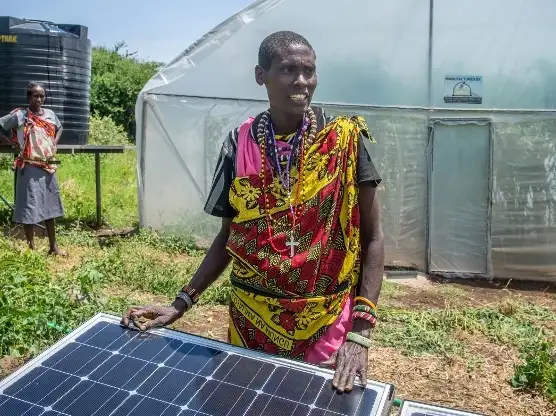
Bringing Agenda 2030 to Life - Africa Sustainable Development Report
Synthesis report, executive summary and key findings.


Solar panels helping farmers affected by climate change in Kenya to make a sustainable living. The Sustainable Development Goals support action on climate change, renewable energy, hunger and other development issues
The 'Bringing Agenda 2030 to Life' project aims to bring voices and examples from the ground into discussions about how to implement Agenda 2030 and the Sustainable Development Goals (SDGs) in a transformational way. The five reports are meant to help civil society organisations in their engagement with policy-makers at national and global level.
The project was implemented in Sierra Leone, Liberia, Kenya and Zambia. It was coordinated by University College London (UCL) and CAFOD in partnership with Caritas Sierra Leone, the National Commission for Justice, Peace and Caritas Liberia, Caritas Kenya, Caritas Zambia and Caritas Africa.
The purpose of this research is to refocus the development debate on the four transformative principles of Agenda 2030:
leave no-one behind
tackle inequalities
integrate environment and development
promote participation and dialogue.
The reports below bring a values-based voice and authentic experience from the ground. Through this research we try to help visualise how the transformative principles look like in practice through concrete projects, programmes and policies.
In the research we discussed some of the ways in which Pope Francis’ Encyclical, Laudato Si’, both affirms and challenges Agenda 2030, drawing on analysis already conducted by Catholic development agencies including CAFOD.
While each national report presents findings that are country-specific, the following were found in all four country examples:
Ensuring that no-one is left behind requires both economic and social strategies to reduce stigma and help marginalised groups to claim their rights.
Health, education and judicial systems all need to be inclusive, leaving no-one behind and tackling inequalities at the same time. For the poorest and most at risk, local and national governments need to provide additional support to enable them to access these systems.
Work on the pressing issues of climate-change and environmental degradation can offer new opportunities to employ left-behind groups
The principle of participation and dialogue can work at multiple levels to enhance outcomes for the poorest, between communities and multinational companies as well as between left-behind groups and governments.
We hope readers will be inspired by these reports and use the transformative principles to inform their advocacy and programmes. We also hope the research represents a useful contribution to the challenge of translating and implementing Agenda 2030 in individual countries and reporting on progress as we approach 2030.

Synthesis report, executive summary and key findings.




CAFOD submits written evidence to parliamentary inquiries and consultations to support our global policy and research work.
Find out more about campaigning on social justice issues with CAFOD.